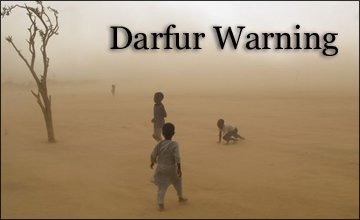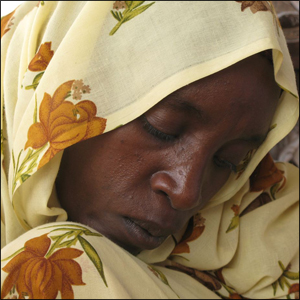Darfur Warning
Darfur Warning
tk
Despite five years of genocidal counter-insurgent warfare in Darfur, millions among its ravaged civilian population will soon enter a third month of receiving only half the necessary food rations from the UN’s World Food Program (WFP). Even with the presence of the world’s largest humanitarian relief operation, the people of Darfur begin the current rainy season with only half the minimum kilocalorie diet necessary to sustain human life. Since the rainy season coincides with the traditional “hunger gap”–the period between spring planting and fall harvest–we may expect to see significant human starvation in the coming months, relentlessly adding to the hundreds of thousands of deaths from ethnically targeted violence and displacement. A grim genocide by attrition is set to enter into its deadliest phase.
 How can this be? And why don’t the alarms sounded by humanitarian organizations compel greater international response? The answers to these questions tell us too much about why Darfur’s agony shows no signs of abating.
How can this be? And why don’t the alarms sounded by humanitarian organizations compel greater international response? The answers to these questions tell us too much about why Darfur’s agony shows no signs of abating.
Since the beginning of May, WFP has delivered to Darfur only half the required food tonnage. The reason is because of Darfur’s insecurity. Food convoys face the constant threat of violent hijacking. Drivers are beaten, robbed, and too often killed; as a result, they increasingly refuse to make the dangerous trip through the western part of Kordofan Province and especially inside Darfur. The Khartoum regime should of course provide military escorts for these critical, though highly vulnerable, convoys. But the National Islamic Front comprises the very men responsible for orchestrating the Darfur catastrophe. Although they have made soothing noises about protecting food convoys, they have in fact done nothing of significance.
Indeed, Khartoum is much more interested in militarily supporting its proxy force of Chadian rebel groups, reportedly massing for a new assault on N’Djamena and the regime of Idriss Déby. Khartoum holds Déby responsible for supporting the Justice and Equality Movement (JEM) attack on Omdurman, and this would appear to be the moment in which the regime means to settle the score.
Just as scandalous, the protection force authorized by UN Security Council Resolution 1769 (July 2007) has failed to improve the situation, and despite two years of planning by the UN’s Department of Peacekeeping Operations, the UN-African Union “Hybrid” Mission in Darfur (UNAMID) is failing badly–and rapidly losing the confidence of Darfuris. Humanitarian groups repeatedly say in private conversations that they are fearful of being too closely associated with UNAMID because its growing failure is perceived by Darfuri civilians and rebels as a sign that it has implicitly sided with Khartoum.
Khartoum’s largely successful campaign of obstruction of UNAMID deployment only fuels the deep anger and resentment among the people of Darfur who justly feel that they have been abandoned. Khartoum refuses to allow key battalions of troops, engineers, and special forces to deploy, has deliberately attacked UNAMID forces, and has looked on with indifference as its Janjaweed militia allies recently humiliated a UNAMID patrol in West Darfur, taking the soldiers’ weapons and communications gear.
 For their part, the militarily capable nations of the world have done little to augment UNAMID, or to confront Khartoum over its obstructionist tactics. As a consequence, UNAMID currently operates without required logistics, without critical transport capacity (especially helicopters and trucks), and without other essential military equipment.
For their part, the militarily capable nations of the world have done little to augment UNAMID, or to confront Khartoum over its obstructionist tactics. As a consequence, UNAMID currently operates without required logistics, without critical transport capacity (especially helicopters and trucks), and without other essential military equipment.
Insecurity has not only severely compromised the delivery of food into Darfur, it has also diminished access to what the UN estimates are 4.3 million conflict-affected persons scattered throughout a region the size of France. The consensus among humanitarian workers on the ground is that they have access to about 40 percent of this vast population–leaving as many as 2.5 million people without reliable access to food, clean water, and primary medical care
The problems don’t end here, however. Malnutrition rates, especially among children under five, have risen above the emergency threshold last fall, following a disastrous harvest in South and North Darfur (regions that make up three-quarters of Darfur’s total population). And yet important subsequent malnutrition studies have not been disseminated because Khartoum has objected to their publication and humanitarian organizations–fearing a loss of access–have acquiesced. Just as troubling, new malnutrition studies and collections of data are also being obstructed by Khartoum’s génocidaires in a patent effort to obscure the growing threat of widespread, engineered starvation.
But such a risk grows by the day. Suleiman Jamous, previously the senior rebel humanitarian coordinator and the most reliable of rebel leaders, recently told me he expected that there would be large-scale starvation in rebel-held areas (the vast majority of Darfur), at least among communities without any livestock reserves. Not nearly enough food has been pre-positioned prior to the rainy season, a season that makes much of Darfur an impassable sea of mud and raging streams. Without food pre-positioned in Darfur, there are insurmountable logistical obstacles in providing adequate food to the immense and badly weakened populations that are the most at risk. Jamous also told me that he believes well over half the “banditry” so often invoked in explanations of insecurity in Darfur is anything but random: Khartoum either acquiesces to, is complicit in, or orchestrates the attacks that have claimed the lives of so many humanitarian workers, and so attenuated humanitarian access.
Tens of thousands of civilians continue to be displaced–so far, over 150,000 in 2008. Many were displaced during Khartoum’s large-scale scorched-earth campaign north of el-Geneina in February–and a significant number of the the displaced fled into eastern Chad and extremely uncertain humanitarian conditions. The camps for displaced persons have long been badly overcrowded, and there is no way to accommodate many of the newly displaced. Moreover, water tables for potable water are dropping dangerously, increasing the risk of deadly water-borne disease during the rainy season.
What must not be lost in any understanding of the current phase of Darfur’s humanitarian crisis is the deliberateness with which it has been engineered. Luis Moreno-Ocampo, chief prosecutor for the International Criminal Court, recently offered to the UN Security Council (June 5, 2008) a searing indictment of the Khartoum regime.
Invoking the horrors of Nazi Germany and the UN failure at Srebrenica, Moreno-Ocampo declared that the evidence he has accumulated over more than two years of sustained investigation, authorized by the UN Security Council, “shows an organized campaign by Sudanese officials to attack civilians, in particular the [non-Arab] Fur, Massalit, and Zaghawa, with the objective [of] physically and mentally destroying entire communities.”
There could be no clearer assertion of genocidal intent. Nor is there any evidence that the consequences of that intent will diminish anytime soon.
Eric Reeves is author of A Long Day’s Dying: Critical Moments in the Darfur genocide. This article also appeared in the Sudan Tribune. Photos: Mia Farrow.






